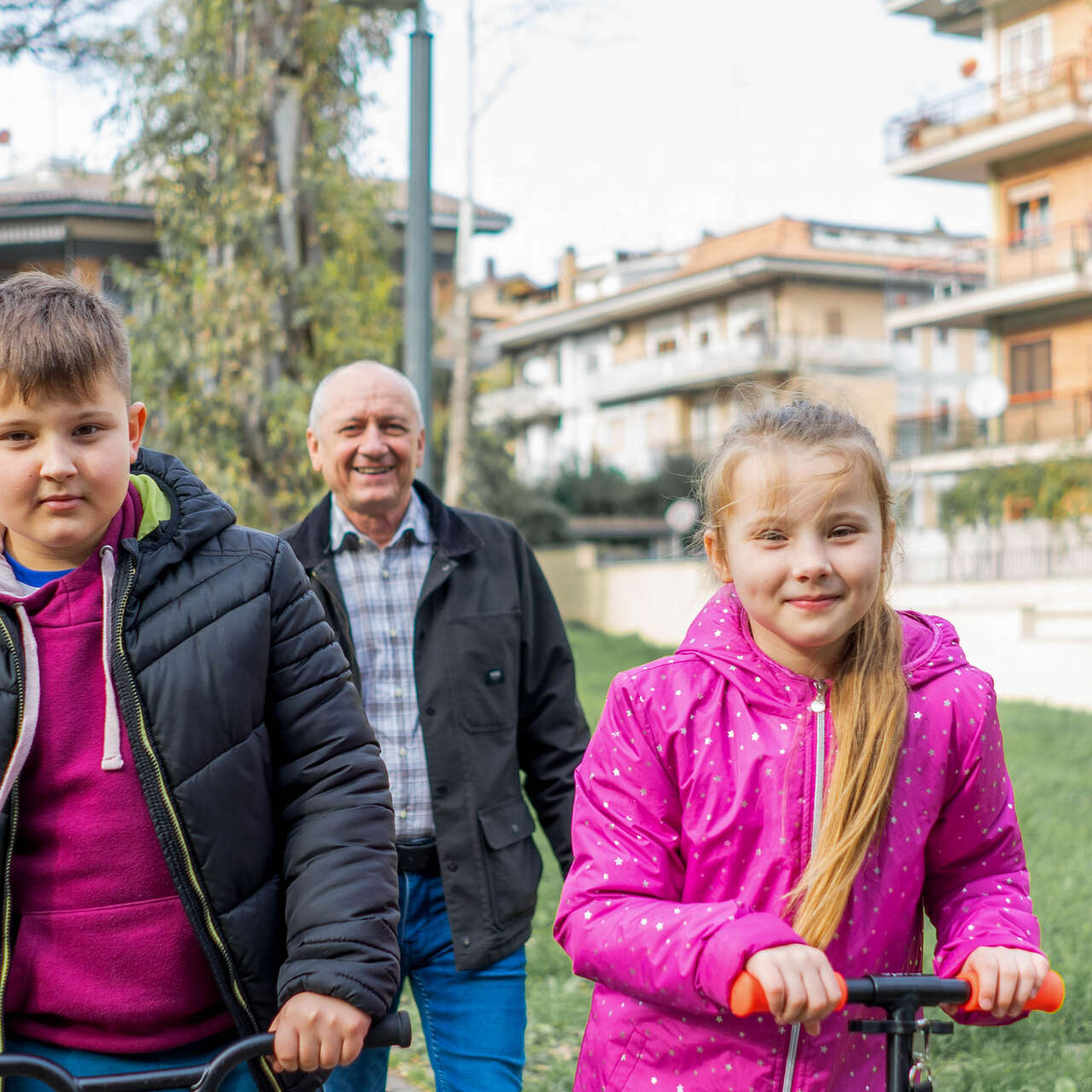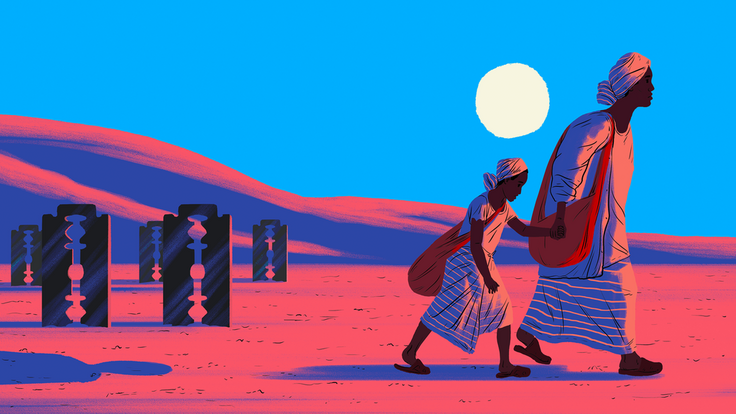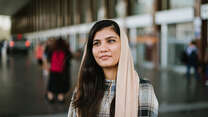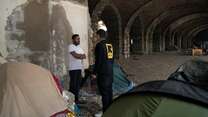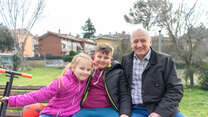Country facts
- Population: 59 million
- Almost 700,000 asylum seekers arrived in Italy since 2015
IRC response
- Started work in Italy: November 2017
Visita questa pagina in italiano.
The IRC in Italy provides essential safety, empowerment, education, livelihood and health services to migrants, refugees and asylum seekers. Our programs operate across the country, including in Trieste, Milan, Rome, Turin and various locations in Sicily and Calabria, with a strong focus on supporting the most vulnerable populations, such as women and children.
The IRC's work in Italy:
Our work in Italy addresses the needs of people seeking protection by offering direct support, collaborating with local organizations, and working alongside national authorities and institutions to enhance the asylum system and improve humanitarian conditions.
The IRC's areas of focus in Italy include:
ROWING TEAMS
In partnership with local actors, the IRC supports refugees, asylum seekers, and people on the move through mobile protection teams in key arrival and transit locations across Italy.
TRIESTE
Since 2021, the IRC has been working in Trieste to support asylum seekers and people on the move arriving from the Balkans. We provide non-food items, legal orientation and facilitate access to crucial services such as food, medical care, overnight shelter and a legal helpdesk. IRC also facilitates access to the asylum procedure and reception. Since 2024, in the framework of a project co-designed with with the Municipality of Trieste and other third sector organizations led by Caritas Trieste, IRC has provided support to individuals and families in need of low-threshold services, especially those with a migrant background.
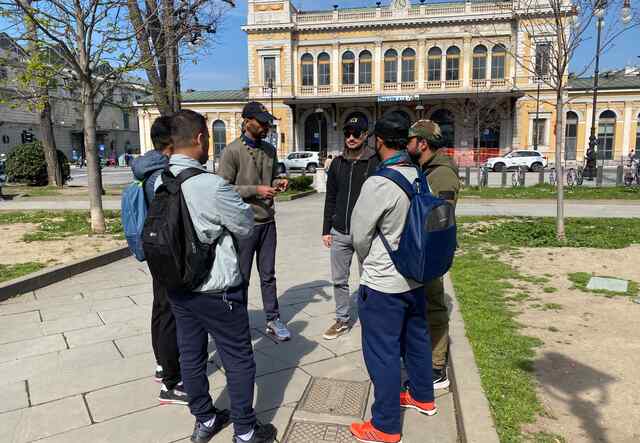
SOUTHERN ITALY
Under the technical coordination and operational supervision of UNHCR, since May 2024, IRC Italy provides cross-sectoral protection services in selected key disembarkation points and transit areas through four roving teams to identify, advise and refer persons with specific needs to available services in the territory.
MILAN
In Milan, since September 2023, a mobile IRC team continues to support newly arrived and transiting migrants, addressing their immediate needs. IRC conducts outreach through a street unit operating near the Central Station to engage individuals in serious distress and connect them with services.
The team provides information regarding their rights and status in the territory, identifies specific vulnerabilities and protection needs, facilitates safe referrals, and supports access to local services. It also ensures that unaccompanied foreign minors are taken in by the appropriate authorities and distributes essential supplies.
PROTECTION ACTIVITIES IN COLLABORATION WITH THE MUNICIPALITY OF MILAN
Since September 2023, the IRC has been actively involved in several co-design processed led by the Municipality of Mila involving over 40 third-sector organizations, which has lead to the co-development of several projects aiming to strengthen the reception and integration system of the city with a strong focus on protection.
From October 2023 to December 2024, IRC participated in a co-design effort with the Municipality of Milan and 13 third-sector organizations in the framework of the First Steps project, financed by the Global City Fund. The IRC offered capacity building and coaching to project partners providing early services to migrant children aged 0 to 6 and and their newly arrived caregivers in Milan.
In 2024 and 2025 IRC has continued and expanded its capacity building role in the protection domain by focusing on the staff and guests of the municipal center of ‘Casa Jannacci”. In addition to training its staff, IRC assist the shelters’ social workers to identify and respond to residents' needs, particularly for vulnerable cases such as gender-based violence, trafficking, and exploitation, also drafting standardized operational protocols to streamline interventions.
Within the shelter, IRC runs a Women and Girls Safe Space open to the mothers hosted in the facility and conduct information sessions on relevant topics like sexual health and affectivity education.
In 2025 and 2026 3 new projects developed through a co-design process and funded from the Italian Migration, Asylum, and Integration Fund will be launched: Italiano Secondo Me, offering Italian experiential workshops for children and their caregivers; ARCO, aimed at strengthening the Milan Welcome Center; and Lab Impact, focused on enhancing social services for children and families with a forced migration background.
REFUGEE.INFO ITALY
Access to information is critical for displaced communities to make informed decisions and stay safe. Since 2018, IRC Italy's digital information service Refugee.Info Italy (RI), part of Signpost, has provided refugees and migrants with multilingual, accessible, actionable and accurate information nationwide.
Through instant messaging apps, social media, a website and a peer-to-peer approach, we address clients’ information needs concerning their rights, documents, safety, support services and integration into new communities.
The service is currently available in English, French, Dari/Farsi, Pashto, Arabic and Ukrainian.
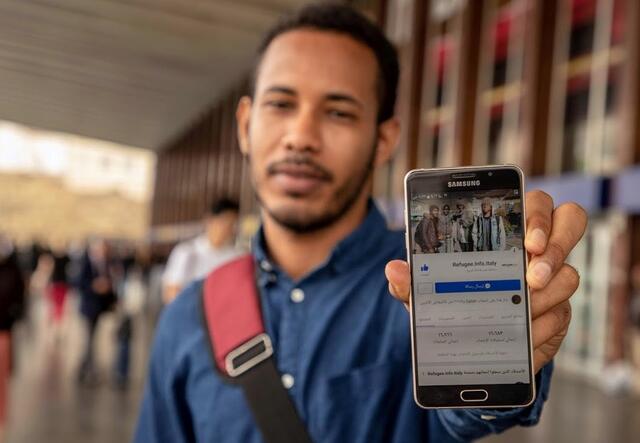
PROTECTION MONITORING
IRC Italy produces quarterly protection monitoring reports, underscoring our commitment to strengthening our protection activities.
These reports regularly assess the protection situation of those we assist, capturing client profiles, vulnerabilities, protection risks across Italy.
They also include significant migration-related updates nationwide, insights on clients using IRC's digital information service, Refugee.Info, and individuals arriving via the Balkan route.
For more reports, visit our IRC Italy reports page.
WOMEN PROTECTION, EMPOWERMENT AND PSYCHO-SOCIAL SUPPORT
Women and girls arriving in Italy face significant risks and challenges, including gender-based violence, trafficking, sexual exploitation, discrimination based on origin and legal status, poor living conditions in reception centers, social isolation and limited access to resources and employment.
Since 2019, the IRC has partnered with local organizations to establish Women and Girls Safe Spaces (WGSS) in Rome, Palermo, Milan, Turin and Trieste. These safe spaces use an evidence-based approach where migrant women and girls can participate in creative activities, access psychological and case management services, build social networks, and empower themselves in a secure environment for both them and their children.
The IRC also builds the capacity of local actors to support clients using trauma-informed, transcultural approaches. With teams of caseworkers and cultural mediators, we conduct vulnerability assessments and offer holistic case management to ensure clients' safety and facilitate their integration.
COMPLETED PROJECTS
Since January 2023, the IRC took over and expanded a project aimed to assist Ukrainian refugees hosted in the Capannelle and Mercure West Hotels. A multidisciplinary team consisting of a case-worker, a psychologist and a cultural mediator has been providing individual assistance and psychosocial support to the most vulnerable guests, including for survivors of gender-based violence, helping them access documents, healthcare, education, social services.
In late 2023, partnering with Laboratorio di Gruppo Analisi (LdG), IRC opened a Clinical Center for Ethnopsychology and a Women and Girls Safe Space (WGSS) near the Termini Station
Within the WGSS, LdG offers individual mental health support, while IRC provides holistic case management, group psyco-social support and, thanks to the WISE project will be offering economic inclusion services.
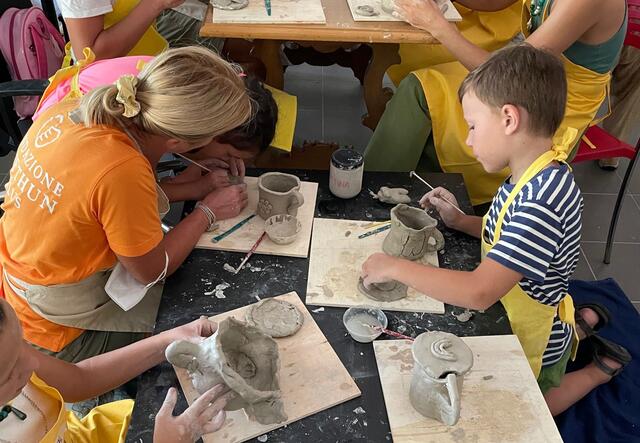
From October 2023 to March 2024, IRC deployed a roving team including cultural mediators to respond to the most urgent needs of people on the move and asylum seekers, especially those not hosted in government reception centers, coordinating with other NGOs such as MEDU, Intersos, Civico Zero (Save the children) and MSF.
The team operated off of the Tiburtina station and off of the Prefettura to ensure that people on the move and asylum seekers received essential support and accurate information to help them meet their basic needs. The team reached 730 people by distributing in-kind supplies, providing Psychological First Aid to those facing acute distress, and guiding individuals toward safe access to local services.
Since 2021, through the EU funded projects FAST, DIRECT and SAFE-HUT, IRC has worked with several partners in Italy and across Europe to strengthen the capacity of over 1100 frontliners and migrant led organizations’ members to identify (potential) victims of trafficking and to assist survivors adopting a through trauma-informed care and ‘do no harm’ approach. To increase the level of inclusion of P/VoT in society, by giving to them the necessary tools to enhance protective factors, prevent the risk of (re)trafficking and exploitation, IRC has provided direct services to p/VoT refugees and asylum seekers hosted in reception centers in Sicily. In particular, IRC has offered over 190 UAC with accurate and actionable information on their rights in Italy and where to seek support, as well as with life skills sessions. Over 50mother survivors and women exposed to the risk of trafficking have participated in group activities aimed to strengthen their parenting skills. The IRC Italy digital platform Refugee.Info Italy, thanks to wide reach within the diaspora population, is used as primary tool to contribute to the online awareness-raising campaign on human trafficking.
COMPLETED PROJECTS
SAFE HUT
Safe Hut is an EU-funded project focused on empowering and supporting the social and labor integration of third-country national women and girls exposed to trafficking, with a special focus on those affected by the Ukraine crisis. The project involved 7 partners from 6 EU countries—Italy, Germany, Greece, Lithuania, Romania and Bulgaria—many of which have been central to Ukrainian migration.
DIRECT
Under the EU-funded, 2-year project, DIRECT, the IRC provided direct support to unaccompanied children and women who are survivors or at risk of trafficking. The project also enhanced the skills of migrant-led organizations and first responders in identifying and assisting survivors, while strengthening efforts to prevent human trafficking through collaborative work with these organizations.
IRC Italy is actively working to ensure that asylum seekers and refugees’ rights are respected and upheld. We monitor the obstacles that individuals seeking international protection face in formalizing their application and facilitate access to the asylum procedure and reception.
IRC is also an active member of the Asylum and Immigration Advocacy Newtork (Tavolo Asilo e Immigrazione), the Working Group for the Convention on the Rights of the Child (CRC Group), the Road Map for the Right to Asylum, and the Integrated Reception Network (RAI Advocacy Network).
Data and information collected at the field level is used to inform our evidence-based advocacy priorities. In particular, the IRC has contributed to discussions with institutional representatives to strengthen the reception and integration system for asylum seekers and refugees, both at local and national level, advocating on issues including changes to national protection laws, externalization policies and immigration detention.
The IRC is actively engaged in several EU-funded projects that includes a strong advocacy component to strengthen migrant inclusion, youth empowerment, and community support across Europe:
INNOVATE
INNOVATE is an EU-funded project coordinated by the European University Institute, aimed at promoting policy-making based on facts and evidence rather than on beliefs and ideologies. WithinINNOVATE, the IRC advocates for the rights of migrant children in Greece, Italy, and Serbia by combining research with the voices of those most affected by migration policies.
PARTICIPACTION
ParticipACTION is an EU-funded project coordinated by IRC Italy, aimed at increasing youth involvement in decision-making. The ParticipACTION project works to increase youth’s ability to shape EU policies by focusing on the engagement of third country national—in Italy, France, Lithuania, and Cyprus through research, workshops, and advocacy, fostering mutual understanding and solidarity.
GROWTH
Through GROWTH, coordinated by Consorzio Communitas, the IRC supports the expansion of community sponsorship schemes in Italy, Ireland, Germany, and beyond by monitoring quality, evaluating progress, and helping implement strategies that recruit diverse sponsors and explore innovative housing solutions.
Since 2021, IRC has partnered with local education systems to enhance educators’ capacity to create environments that foster children's well-being and holistic development in safe, welcoming and child-friendly settings. A special focus is given to childrenwho have experienced, or are at risk of, adverse childhood experiences, particularly migrant and refugee children. Education is a right, and key to a bright future, and displaced children often face difficulty in accessing and integrating into schools.
The IRC’s Holistic Educational Approach equips educators with tools and strategies to foster cognitive and social-emotional growth, using a transcultural perspective to meet the needs of diverse children.
Since 2021, the IRC has trained over 1,300 educators, primary school teachers and school managers in partnership with the Municipality of Milan.
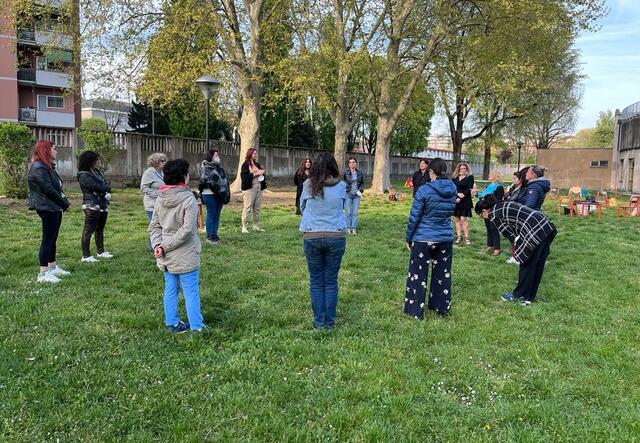
THEORY OF CHANGE
The IRC is engaged in several EU-funded projects that promote inclusive education and support for refugee and migrant students across Europe. In the Theory of Change project, led by CODECA and implemented in Italy, Greece, Cyprus, and Sweden, the IRC works alongside partners to support educators, adolescents (ages 11–19), and migrant families in overcoming challenges related to education and integration. The project provides education professionals with tools and resources to foster language learning and inclusion through holistic and inclusive teaching practices in both formal and non-formal settings.
ADAPTATION OF HEALING CLASSROOM
In the project Adaptation of Healing Classrooms to Support Refugees in General Education Schools the IRC Italy provides capacity building to Estonian educators on the Healing Classrooms methodology to improve their ability to meet the needs of diverse learners, and the broader school communities gain access to best practices that promote long-term collaboration.
LET'S GROW SMART TOGETHER
Through the Let’s Grow Smart Together project, IRC Italy creates age-appropriate spaces and opportunities to empower 15–19-year-old students with a migration background residing in one of Milan marginalized neighborhoods. Activities include establishing safe spaces for integration and orientation, and providing social and psychological support through dedicated caseworkers, with a particular focus on connecting schools and families to address students’ vulnerabilities.
Since 2020, through direct service delivery informed by a holistic approach, as well as through capacity building of relevant services providers, IRC Italy has supported refugees, migrants, and vulnerable groups—especially youth and women—in navigating job markets and achieving self-sufficiency, while promoting the value newcomers bring to local economies
DIGITAL HORIZONS
Digital Horizons helps newly arrived migrant and refugee youth (aged 16–25) in Piedmont and Friuli Venezia Giulia accessing sustainable employment through IT skills development, individual guidance and social support. By partnering with vocational training providers, public job centers, and local employers and providing tailored software development training and wrap-around support, the project seeks to break down integration barriers and build pathways to long-term work opportunities.
IT-BRIDGE
Similarly, through the IT-Bridge project, IRC supports youth with a migrant background, especially NEETs, industry-aligned IT training and personalized support to reduce barriers such as language, access, and limited networks.
WISE
The WISE project integrates mental health and psychosocial support with employment services enabled by technology-driven solutions to improve the socio-economic inclusion and wellbeing of refugee women from Ukraine in Milan, Turin and Rome. By piloting Holistic Support Centres (HSCs) as hubs of integrated service delivery, it aims to enhance women’s skills-job match, lifelong learning, access to the labour market, and to social and public services HSCs leverage the IRC’s Women and Girls Safe Spaces evidence-based approach, implemented in Italy since 2019 to promote women’s and girls’ wellbeing and empowerment by providing them with a secure environment where they can build social networks and join a variety of activities and psycho-social support services.
WIN
Lastly, with the WIN project, the IRC focuses on building the capacity of municipal employment centers and local services to deliver inclusive employment support to migrants, refugees and asylum seekers. Activities include: group trainings on trauma-informed service delivery and strengths-based approaches to job counseling as well as on legal framework and regulations on labour law; collaborative development of content and technical support for improving policies and procedures, assistance with designing effective outreach strategies.
